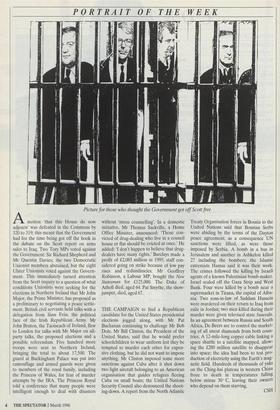PORTRAIT OF THE WEEK
Picture for those who thought the Government got off Scott free Amotion 'that this House do now adjourn' was defeated in the Commons by 320 to 319; this meant that the Government had for the time being got off the hook in the debate on the Scott report on arms sales to Iraq. Two Tory MPs voted against the Government: Sir Richard Shepherd and Mr Quentin Davies; the two Democratic Unionist members abstained, but the eight Ulster Unionists voted against the Govern- ment. This immediately turned attention from the Scott inquiry to a question of what conditions Unionists were seeking for the elections in Northern Ireland that Mr John Major, the Prime Minister, has proposed as a preliminary to negotiating a peace settle- ment. British civil servants held talks with a delegation from Sinn Fein, the political face of the Irish Republican Army. Mr John Bruton, the Taoiseach of Ireland, flew to London for talks with Mr Major on all- party talks, the proposed elections and a possible referendum. Five hundred more troops were sent to Northern Ireland, bringing the total to about 17,500. The guard at Buckingham Palace was put into camouflage and armed guards were given to members of the royal family, including the Princess of Wales, for fear of murder attempts by the IRA. The Princess Royal told a conference that many people were intelligent enough to deal with disasters without 'stress counselling'. In a domestic initiative, Mr Thomas Sackville, a Home Office Minister, announced: 'Those con- victed of drug-dealing who live in a council house or flat should be evicted at once.' He added: 'I don't happen to believe that drug- dealers have many rights.' Barclays made a profit of £2,083 million in 1995; staff con- sidered going on strike because of low pay rises and redundancies. Mr Geoffrey Robinson, a Labour MP, bought the New Statesman for £125,000. The Duke of Atholl died, aged 64. Pat Smythe, the show- jumper, died, aged 67.
THE CAMPAIGN to find a Republican candidate for the United States presidential elections jogged along, with Mr Pat Buchanan continuing to challenge Mr Bob Dole. Mr Bill Clinton, the President of the United States, said that he would prefer schoolchildren to wear uniform lest they be tempted to murder each other for expen- sive clothing, but he did not want to impose anything. Mr Clinton imposed some more sanctions against Cuba after it shot down two light aircraft belonging to an American organisation that guides refugees fleeing Cuba on small boats; the United Nations Security Council also denounced the shoot- ing-down. A report from the North Atlantic Treaty Organisation forces in Bosnia to the United Nations said that Bosnian Serbs were abiding by the terms of the Dayton peace agreement; as a consequence UN sanctions were lifted, as were those imposed by Serbia. A bomb in a bus in Jerusalem and another in Ashkelon killed 27 including the bombers; the Islamic extremists Hamas said it was their work. The crimes followed the killing by Israeli agents of a known Palestinian bomb-maker. Israel sealed off the Gaza Strip and West Bank. Four were killed by a bomb near a supermarket in Tirana, the capital of Alba- nia. Two sons-in-law of Saddam Hussein were murdered on their return to Iraq from exile in Jordan; two men killed during their murder were given televised state funerals. In an agreement between Russia and South Africa, De Beers are to control the market- ing of all uncut diamonds from both coun- tries. A 12-mile-long copper cable linking a space shuttle to a satellite snapped, allow- ing the £280 million satellite to disappear into space; the idea had been to test pro- duction of electricity using the Earth's mag- netic field. Hundreds of thousands of yaks on the Ching-hai plateau in western China froze to death in temperatures falling below minus 30° C, leaving their owners who depend on them starving. CSH


































































 Previous page
Previous page